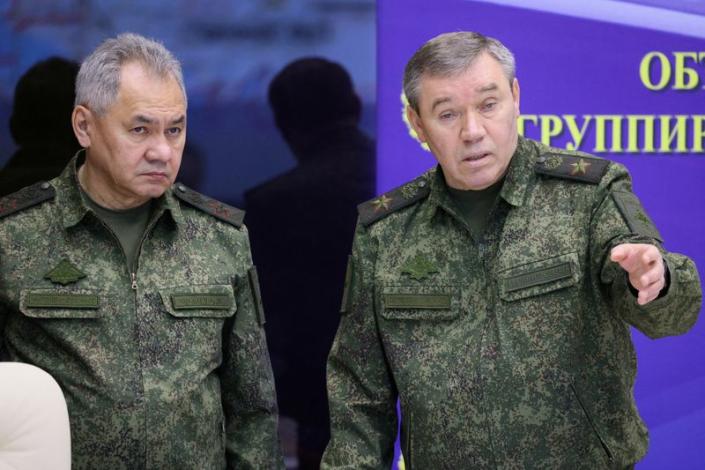Russian Army General Valery Gerasimov, the chief of the general staff of Russia’s armed forces, made his first public appearance on Monday since the failed mutiny by the Wagner mercenary group on June 24. This public appearance indicates that Gerasimov has retained his position as the third most powerful man in the Russian military, after President Vladimir Putin and Defence Minister Sergei Shoigu.
Gerasimov, who is now 67 years old, holds the rank of army general and was appointed as chief of the general staff and deputy defence minister by Putin on November 9, 2012. He is believed to be one of the individuals who holds a nuclear briefcase capable of transmitting orders for a nuclear strike.
The general has played significant roles in Russia’s annexation of Crimea from Ukraine in 2014 and in providing military support to President Bashar al-Assad in the Syrian Civil War. As a result, he was sanctioned by the United States the day after the invasion of Ukraine, with the U.S. holding him directly responsible.
In January, Putin appointed Gerasimov to lead the Ukraine campaign and made Army General Sergei Surovikin, who had been appointed to the role three months earlier, one of his three deputies.
However, Gerasimov has faced criticism for the conduct of the war, particularly from nationalist war bloggers who blame him for the failure of the Russian military to subjugate Ukraine. Critics both within Russia and in the West argue that the army has been poorly equipped, slow to react, and plagued by muddled command structures.
Rumors had been circulating for months that Gerasimov would be sidelined following a failed mobilization campaign last year. In September, during war games in the Russian far east, a video published by the Zvezda military news service showed Putin and Gerasimov sitting far apart in an observation booth, waiting for Shoigu to arrive, creating an awkward silence.
The head of the mercenary Wagner Group, Yevgeny Prigozhin, fiercely criticized Gerasimov and Shoigu and staged a short-lived mutiny on June 23-24, demanding their dismissal. Gerasimov had not been seen in public since early June and did not make any public appearances or statements during the mutiny, which was called off after Prigozhin received a promise of exile and immunity for the mutineers.
Gerasimov’s earlier life includes graduating from the Kazan Higher Tank Command in 1977, the Malinovsky Military Armoured Forces Academy in 1987, and the Military Academy of the General Staff a decade later. He was appointed commander of the Leningrad Military District in 2007 and the Moscow Military District in 2009.
With Gerasimov’s public appearance, it is clear that he has retained his position as the chief of the general staff of Russia’s armed forces, despite previous rumors of his potential sidelining.

What are some of the key roles and actions that General Valery Gerasimov has been involved in throughout his career, and how have they contributed to his influence within the Russian military
Failed mutiny by the Wagner mercenary group on June 24. Despite this incident, Russian Army General Valery Gerasimov made a public appearance on Monday, reaffirming his position as the third most powerful figure in the Russian military, following President Vladimir Putin and Defence Minister Sergei Shoigu.
Gerasimov, who is now 67 years old, was appointed as chief of the general staff and deputy defence minister by Putin on November 9, 2012. Holding the rank of army general, he is known to be one of the few individuals entrusted with a nuclear briefcase capable of transmitting orders for a nuclear strike.
Throughout his career, Gerasimov has played significant roles in key events such as Russia’s annexation of Crimea from Ukraine in 2014 and providing military support to President Bashar al-Assad during the Syrian Civil War. These actions have garnered him attention and influence, as well as sanctions from the United States the day after the failed mutiny by the Wagner mercenary group. Despite this, Gerasimov’s public appearance indicates that he has retained his position of power within the Russian military.

It is great to see General Valery Gerasimov making his first public appearance after the failed mercenary mutiny. His presence reiterates the strength and resilience of the Russian Army, showcasing their commitment to maintaining order and ensuring the safety of the nation.
It is reassuring to see Russian Army General Valery Gerasimov making his first public appearance since the failed mercenary mutiny. This signifies the stability and control maintained by the Russian Armed Forces despite such unfortunate incidents. It also highlights the importance of experienced leaders like General Gerasimov in maintaining the discipline and integrity of the military.